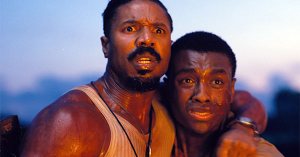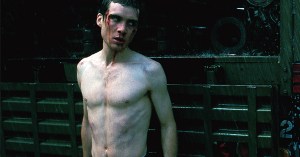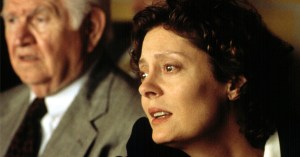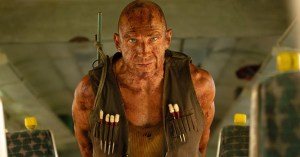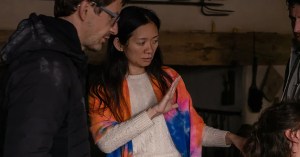Five Favorite Films with John Cusack
The man synonymous with the Top Five list runs down his favorite horror films; plus, he talks about playing Edgar Allan Poe and his underworld phase.
If there’s one actor who was made for the five favorite films quiz, it’s John Cusack, the man who spent the better part of High Fidelity dispensing his own top five lists on matters of girls, relationships, and of course, records.
“Weirdly, I’m not a ‘top five’ guy,” Cusack smiles when we sit down with him to ask the question, before traces of his character start to emerge. “It depends on your mood and how you’re feeling,” he explains. “You gotta give this to me as a genre. I can tell you by different genres.” Since Cusack is in town to promote The Raven — a pulpy murder thriller in which he plays the Godfather of American Goth, Edgar Allan Poe — he decided to run through his five favorite horror films. “We could do the horror genre,” he says, “you know, the scariest movies. I’ve made a couple, but I don’t know how good they are –’cause I’m in ’em.”
Read on for more of our chat with Cusack, in which he talks about his attraction to playing Poe and the many sides of the writer, but first, here are his Five Favorite (Horror) Films.
The Exorcist (William Friedkin, 1973; 85% Tomatometer)
As far as the horror genre, I think The Exorcist is the scariest movie of all time. It’s like head and shoulders above… there’s nothing more terrifying, or deeply sinister than that. When I saw The Exorcist, at that time when I was a kid, I may have slept with the light on. I can’t remember the exact time [I saw it], but I remember being literally knocked back. You have the pure theological question about, you know, “What is the role of evil and what is the nature of evil and what is its function?” And I think in The Exorcist the point is, the reason it’s here is to try and make us give up hope, and find the courage to not give up hope. Evil wants to so demoralize you that you abandon all hope; it’s only human beings’ capacity to love and to fight back. But that’s the role of evil: To challenge, and to make you choose. And growing up as a Catholic, too, I was immersed in the theology and doctrine of the church, so that movie was a serious, serious f-cking movie.
Do you go back to it ever?
Yeah — I mean, not all the time. But it’s an intense thing. Did you ever see the recut version of it?
That was the one I saw for the first time.
I didn’t like the recut version. I didn’t like it as much. I thought there were a couple of scenes that he added in that were improvements, but I think the original is pretty damn perfect.
The Shining (Stanley Kubrick, 1980; 88% Tomatometer)
Well The Shining I thought a lot about, because we did Stephen King’s 1408, which was another movie set in a hotel room, and the madness of that. But I think just seeing it in theaters, you know — I think it’s when you saw it. My mom was from Boston, so we used to go to Nantucket, and it was the summer and I remember I snuck away in the afternoon to go see it, at around 4 or 6 o’clock or something, and when I came back out it was dark and I had to walk down this dark street alone. And I remember being really, I mean really scared coming out of that theater; like, I did not want to leave the street lights to walk home. The other experience I remember was I saw Apocalypse Now in the theaters and I remember coming out of that and I almost couldn’t speak. Stunned.
Night of the Living Dead (George Romero, 1968; 96% Tomatometer)
There’s two Romeros. Night of the Living Dead and the 1978 Dawn of the Dead. I think they’re… well, it’s obviously about racism, and class issues, and consumerism and capitalism, you know, thematically and satirically.
Dawn of the Dead (George Romero, 1978; 94% Tomatometer)
I just think the premise of holding up in a mall… being that prescient about the kind of gated communities, and consumerism, and mixing that with zombies in 1978 is just beyond genius. If you look at, like, John Waters doing Female Trouble in 1974, saying things about crime and beauty and the rise of paparazzi, you know, this kind of crazy Kardashian, TMZ, beauty industry — I mean, as psychotic as that film is, it’s so ahead of the curve. It’s so amazingly looking into the future. So I think those kinds of themes I responded to. And Goblin did the original soundtrack.
28 Days Later… (Danny Boyle, 2002; 88% Tomatometer)
28 Days Later… is pretty damn good. I like that movie. I just liked how Danny Boyle recreated it. I liked its heart, you know. I loved all the actors.
Great music, too. Some Godspeed You! Black Emperor in there.
Yeah. I loved the music, too.
Next, Cusack on the appeal of playing Poe in The Raven and why he’s in his “underworld” phase.
Since we’re talking about The Raven, do you have a favorite Poe movie?
John Cusack: Not a Poe movie, because the [Roger Corman] movies, the ones with Vincent Price, were so kitsch; I think they kind of realized that Poe, in his day, was kind of a satiric writer — he takes the ludicrous and heightens it into the grotesque — but that was only one side of his work. He had this side of him that was pop, pulp, Saturday afternoon thrillers, you know, murders and decapitations and playing on peoples’ neuroses. He had a story where a killer ends up being an orangutan with a razor. I mean, he knew he was being a sensationalistic writer. But then he had another side, which was a master of the English language, an esoteric poet, and just a genius. He had both things. In the same way that he hated anything coarse and saw himself as refined and an aristocrat, kind of a rock star and a regal person, and then he could go into the gutter with the sailors and debauch himself. He had so many extremes. And I think [The Raven] — the conceit of the movie — takes a pop conceit of his, which is Poe becomes a character in one of his own creations. That he gets consumed by his own story, by his own imagination, I think is a very Poe-like conceit — in the pop version of that. So I think that’s what the movie is. But then when Poe deconstructs Poe, we use Poe’s words and his letters and what he wrote; so the things that are coming out of his mouth when he’s discussing his own stories, we use a lot of accurate Poe, even within the fantasy. It’s a dream within a dream thing.
The movie’s set in those last days of Poe’s life in which he was unaccounted for. Do you have your own theory about where he got to?
Well, certainly he didn’t have a real serial killer. This is a fantasy. I think he was on a bender and he died of alcohol poisoning. I just think the body can only take so much. He did a lot of drugs to help him sleep while he was working, you know, and that was synthetic heroin.
Did you enjoy playing him?
Yeah. I mean, I wouldn’t want to stay there forever — it was kind of a dark headspace — but it was pretty exhilarating, becoming a vampire for a while.
How do you approach playing someone like Poe? I mean, there’s a lot known about him but there’s also a mysterious side, and as you said, there were different aspects to his character.
Yeah, you know, he did go to West Point, and he was athletic from an early age and held swimming records; so people don’t know that about him. They’re like, “Oh you’re trying to turn him in to an action hero,” but it’s like, they rode horses, and he was that guy that challenged people to duels, you know. But I think people don’t also know his kind of razor-edged satiric and absurdist style. He was actually kind of funny. I don’t think he was a funny person, I think he was a super serious, thoughtful person, and a sad person, but I think his writing could be very acerbic and cutting; he could be pretty funny.
He was a pretty complex guy.
Oh my God, so many paradoxes.
Was that something that appealed to you about him?
Yeah, I mean as an actor you’re like, “Oh my God, thank you.”
Do you see your characters within a kind of continuum, and if so did Poe fit into this?
Yeah, he did in a way. Sometimes it’s what you choose but sometimes things choose you, I think. It’s like they always say, “If you want to make God laugh, tell him your plans.” [Laughs] So it’s like, you think you’re trying to do certain things, but when I had an opportunity to play Poe of course I jumped at it. I was very excited. I spent basically a year doing movies where I was going into the underground, into the underworld; so I felt I was going into my own subconscious or whatever that space is, that darkness or the underworld. So I did Poe, and then I did The Paperboy with Nicole Kidman, where I play this kind of a Devil, and then I played Robert Hansen [in The Frozen Ground], who’s literally a serial killer. So I felt like I spent kind of a whole year in the underworld, and I didn’t plan it.
You’re in your underworld phase.
Yeah, totally. And I mean, I’ve been there before. I’ve done that kind of thing before. 1408 was certainly into that same kind of thing, in a perhaps more poppy way, but that definitely had some of that same stuff. Stephen King, that’s definitely underworld. But this time I went for a whole three solid films.
Are there any of your characters that you’d like to revisit on film?
War, Inc. was sort of a follow-up to Grosse Point Blank; it was the same kind of political tone and satire — we sort of just changed the character’s name. But I think it would be fun to do a sequel, to do a character again, ’cause I feel like you get to know them, if the movie works. Obviously if the movie doesn’t work you never want to have to think about it again, but if the movie sort of works, or if some people understand what you were trying to do and get it, you know, it would be fun. I just don’t know. I’ve never been kind of a sequel guy; I don’t know why. Basically because all the people die. [Laughs] You can’t do The Grifters 2, you know, ’cause he’s dead.
The Raven is in theaters this week.

